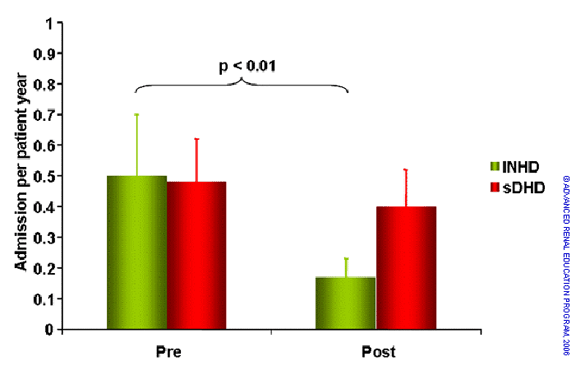Reduction of Hospitalizations
Several authors have described a reduction in hospitalization for patients treated by increased frequency HD compared to conventional therapy. For many of these reports, questions arise regarding control data and other confounding variables – questions that can only be satisfactorily answered with randomized trials. Bergman et al. compared hospitalization rates for CHD and lNHD where reasonable matching was achieved for both regimens1. The study populations were 32 lNHD patients with hospital use data for 1 year before and after 2 years of conversion to lNHD and 42 CHD patients, well matched for age, vintage and controlled for comorbidities, as assessed by the Charlson index, during the same period. The primary outcomes included admission rate, duration of hospitalization, emergency visits and dialysis related biochemical parameters. lNHD was associated with a decrease in admission rate, whereas it remained stable in the CHD cohort during the study period. In the CHD group, cardiovascular disease accounted for 37% of all admissions in comparison to the lNHD group, where access related admission was the primary cause of admission (56%), p=0.001.
 Rate of hospitalization for patients before and after inclusion in the study regimens. Based on reference 1.
Rate of hospitalization for patients before and after inclusion in the study regimens. Based on reference 1.
During lNHD treatment, patients experienced a 66% reduction in hospitalization rates. If confirmed, such a dramatic reduction in utilization of hospital resources would have major implications for cost of health care for dialysis patients. Non-dialysis hospitalization costs often exceed direct dialysis costs.
Reference:
- Bergman A, Fenton SSA, Richardson RMA, Chan CT, Reduction in hospitalizations with nocturnal hemodialysis. J Am Soc Nephrol 15:F-P0550, 2004 (Abstract)
